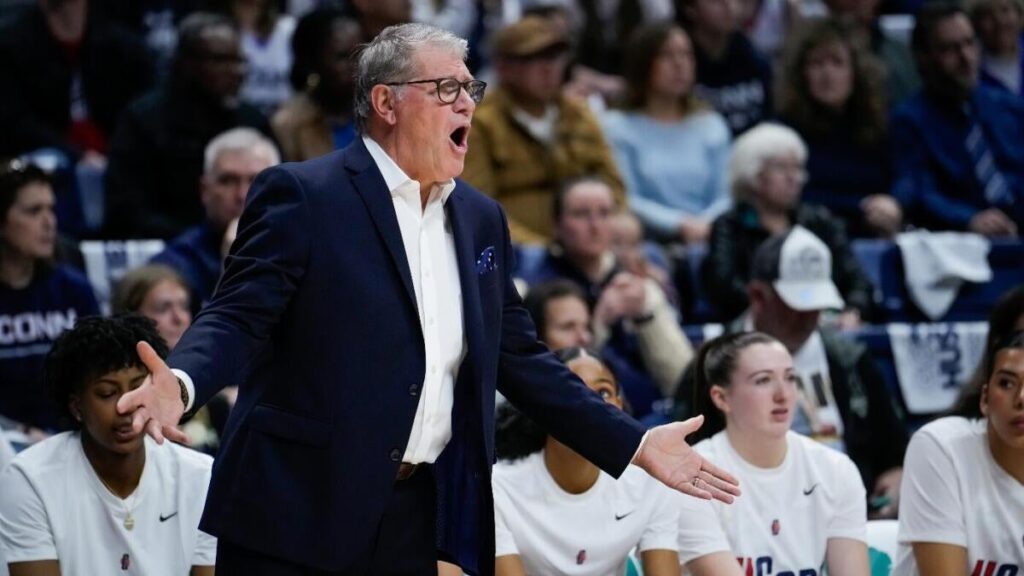In 2023, the NCAA changed the structure of the women’s basketball tournament, condensing regional championships to just two sites instead of four. This year, the two host sites for the Sweet 16 and Elite 8 are Spokane, Washington and Birmingham, Alabama.
The idea behind this concept was to attract more fans to regional venues. Having eight games at each venue instead of four makes it more likely to entice women’s basketball fans to make the trip and buy tickets, meaning attendance is slightly less reliant on fans of the teams playing to fill the arenas. The change also occurred after the spotlight was placed on the NCAA for the facilities and amenities provided to the women’s tournament compared to the men’s tournament, and the centralization of regional championships at two sites made it easier (and, surely, cheaper) to provide better facilities and offerings than doing so at four sites.
Not everyone is a fan of the new system, and on Friday, one of the biggest voices in sports, UConn coach Geno Auriemma, criticized the NCAA for the problems it presents teams during his press briefing. Auriemma was asked about a question about two teams having to travel across the country on Tuesday and then play in the Final Four on Friday in Tampa, and used that as a jumping off point to air his many grievances about the NCAA’s new setup.
“Someone will always have to travel, but it will only be one team. Right? One team,” Auriemma began. “In a normal world run by normal people, there would only be four teams here. Which means there would be no games today. The games would be tomorrow. Which means we wouldn’t need to get up at 6 a.m. to have an hour-long practice at 8 a.m. here this morning. Which means we wouldn’t need to get up at 5 a.m. to do a 7:30 shoot for a half hour, that would give us would take longer to get through security than to actually be on the field.
“God bless whoever wins Monday night, and they have to fly across the country, all day Tuesday, and then they have two days, Wednesday and Thursday, to play the biggest game of their lives. The guys, who don’t know shit, according to a lot of women’s basketball players, finish Sunday, then they have Monday, Tuesday, Wednesday, Thursday, Friday, and then they play Saturday. But there are a lot of people in the women’s basketball community who think they’re smarter than that.
“So whoever invented this super regional thing – and I know who it is – ruined the game. They did it. They ruined the game,” Auriemma continued, continuing his rant. “Half the country has no chance of going to a game in person. But you make billions off television. Well, actually, that’s not the case – that would be the men’s tournament. So, yeah, there are a lot of issues they need to resolve. And again, we could get beat up tomorrow and that won’t change my feelings.”
Auriemma’s complaints are understandable. The practice situation, in particular, is terrible, and the new schedule to play games Friday and Sunday instead of Sunday and Tuesday for the Final Four certainly creates a time crunch. The NCAA could likely alleviate some practice timing issues by selecting regional sites that can accommodate more practice locations and building identical courts in those locations. This may not satisfy coaches who want their teams to have actual field reps in the actual arena, but it might keep them from having to stack practices in the morning because games are in the afternoon.
While Auriemma took a flamethrower to the NCAA, South Carolina coach Dawn Staley sees things a little differently. While she agrees the issue of penalties and the practice schedule is real, she believes the two-region structure is better for fans and helps increase game attendance, which is a worthy tradeoff.
“(The practice schedule) is probably the case,” Staley said when asked about the issues the two regional setups present. “You don’t have shooting time at a reasonable hour. Other than that, I mean, I really like both regions. I like having seven other teams trying to qualify for the Elite Eight and advance to the Final Four in one place. I think it allows our fans, the women’s basketball fans, to gravitate to one place. I know attendance will increase because of that. So ultimately we have to generate revenue as much as possible.”
This year’s travel split for the 1 seeds was fairly simple for the NCAA to determine, as sending South Carolina and Texas to Birmingham and USC and UCLA to Spokane was an easy decision. However, since there weren’t two seeds from the West Coast – TCU being the farthest west – some teams were destined for long travel days, and UConn landed one of the short straws (along with NC State).
Maybe Staley would feel a little differently if South Carolina had to deal with cross-country travel, but one of the benefits of being a perennial top seed is that you tend to be placed in a region closer to home. In the three years the new system has been in existence, South Carolina has played Greenville, Albany and now Birmingham. UConn, on the other hand, has made a trip West every year with the new system, playing second weekend games in Seattle, Portland and now Spokane. It’s clear that frustration has built up over these three trips out West for Auriemma, and he’s going to do his best to push the powers that be to return to the four-region model. This probably won’t happen anytime soon, as future regional locations are already set until 2028.

